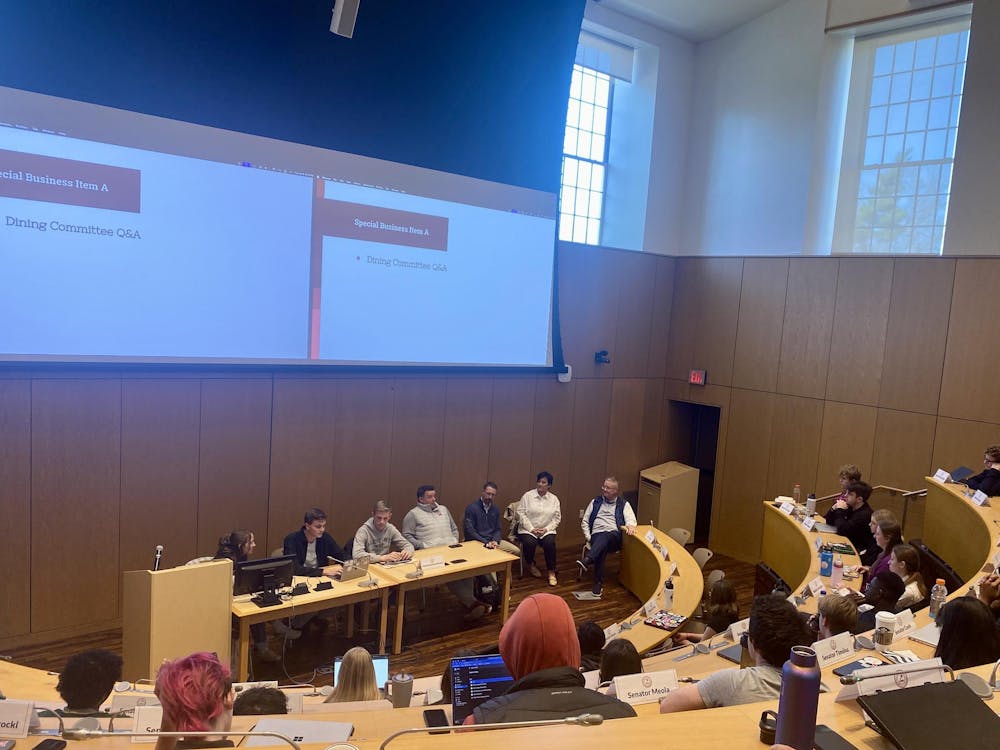Miami University’s Information Technology Services recently expanded its technological offerings with three new artificial intelligence (AI) tools: Google Gemini, Zoom AI Companion and Webex AI Assistant.
According to an email sent out by Information Technology Services, the integration, announced in mid-September, aims to modernize and streamline the university’s academic and administrative workflows by leveraging AI to aid students, faculty and staff.
Brian Henebry, Miami’s associate vice president in solution delivery, said these AI implementations reflect a collaborative approach where the campus community drives technology needs.
“We don’t just go and deploy new tools or functionality on our own,” Henebry said. “We look to the institution to guide us on what their needs are. The campus is driving these implementations, expressing interest in tools like meeting summaries and AI companions.”
Henebry also emphasized the rigorous evaluation process each tool undergoes before deployment.
He said his team pays attention to accessibility, institutional guidance from the state and regulatory rules like FERPA — all tools are evaluated under these frameworks to determine if they can be deployed.
Once approved, Miami’s IT team conducts pilot programs with early adopters to ensure the tools align with the university’s policies and serve the campus effectively.
Henebry also said the faculty responses to AI adoption vary across academic departments.
“When I say ‘academic,’ I’m talking about faculty and the provost,” he said. “Among them, they’re split. Some see it as an incredibly disruptive technology ...”
Henebry added that concerns are heightened especially in departments where traditional scholarship relies heavily on written assignments, like the humanities.
Henebry recounted conversations with professors who acknowledged the ease with which students could use tools like ChatGPT or Gemini to complete assignments.
“If a student was using Gemini to write papers, they could probably get a decent grade in some classes with minimal prompt engineering,” he said.
Enjoy what you're reading?
Signup for our newsletter
This reality is causing faculty to rethink instructional methods, exploring how they can accommodate AI’s presence while preserving academic integrity.
Goole Gemini: Powering learning with AI
Google Gemini, a generative AI chatbot available through Google Workspace for Education, allows students and staff up to 1,000 monthly uses.
While the tool offers extensive support for educational purposes, users are reminded to exercise caution. According to Miami IT’s guidelines, sensitive information should not be entered into the system, and users are encouraged to opt out of data sharing whenever possible.
Zacchary Townsend, a support analyst at Miami’s IT Tech Support Lounge, highlighted how AI tools like Gemini can help students bridge gaps in their digital literacy.
“Students coming in are often accustomed to simpler systems, like Chrome OS or smartphones,” Townsend said. “AI can help bridge that gap, making the technology environment here at Miami more intuitive.”
He said he believes AI will not only aid students in their studies but also boost their confidence in navigating Miami’s digital resources.
AI in virtual meetings: Zoom AI Companion and Webex AI Assistant
Miami’s new Zoom AI Companion and Webex AI Assistant offer features tailored for virtual meetings, including summaries, questions based on transcripts and highlighted action items.
Spencer McCrae, a junior computer science major, said AI tools help simplify his work in coding projects, but some of his professors restrict AI use to help students build foundational skills.
“It’s great to have an AI helper that can suggest solutions or troubleshoot code,” McCrae said.
A long-standing journey with technology
Henebry, who has been at Miami for 16 years, said he sees the adoption of AI as the next step in Miami’s technology evolution.
Recalling past shifts like the switch from Microsoft Outlook to Google Workspace, Henebry reflected on how technology has continually transformed collaboration.
“Back in 2013, collaborative tools were a game-changer,” Henebry said. “Now, students can open documents, share data instantly and chat online — all things that are ingrained into today’s academic life.”
Henebry anticipates AI becoming similarly embedded, noting that phrases like “I’ll just ChatGPT it” may soon be as commonplace as “Google it.”
He also touched on the inevitable challenge of making AI a balanced educational tool.
“AI isn’t always accurate,” he said. “It’s not going to always give you the right information. It will misinterpret what you are asking, so it’s important to use it with a grain of salt.”
For Henebry, AI functions as another “tool in the toolbox,” and finding ways to incorporate it meaningfully into academics is key. He shared his own approach, using AI to draft emails or brainstorm ideas — areas where AI’s assistive role can genuinely save time and improve outcomes.
Henebry summed up the university’s philosophy on AI adoption: “Like any tool, it’ll take the data we give it and provide an answer — but it’s up to us to work with it responsibly.”




